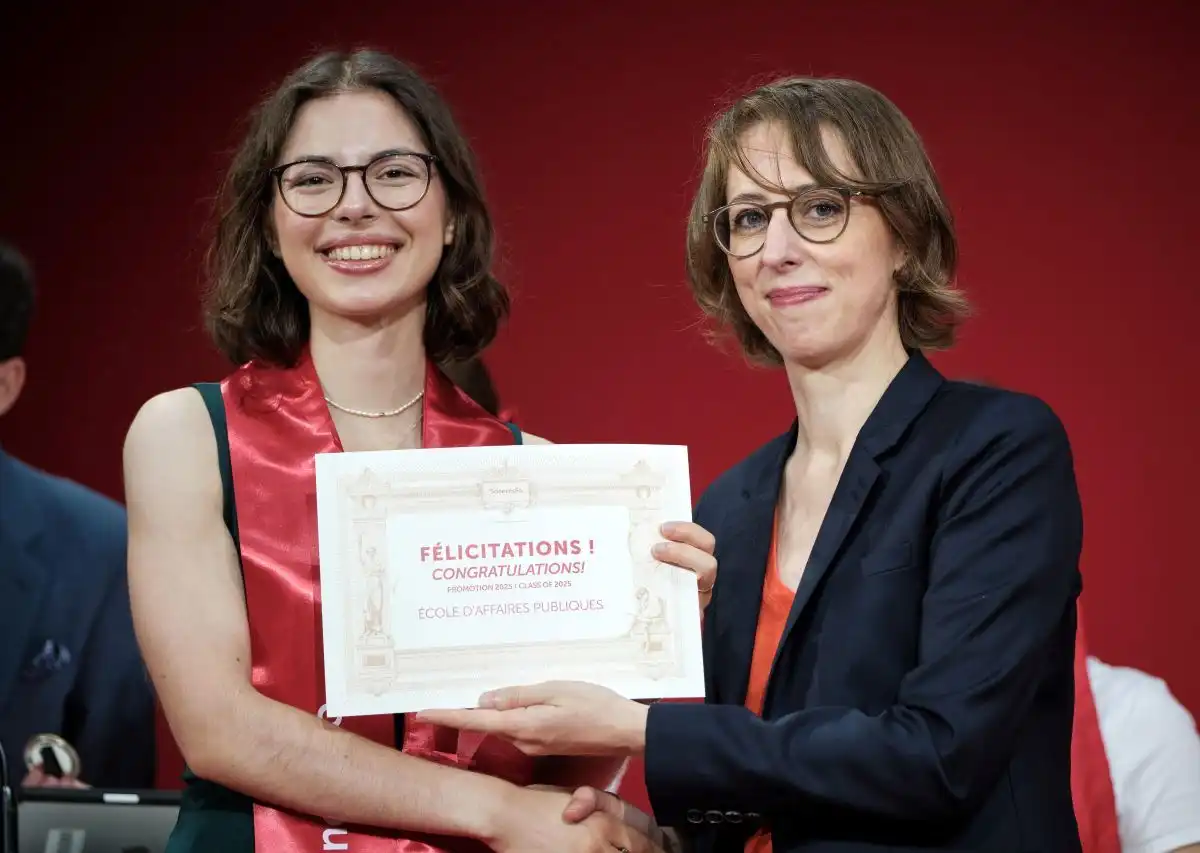Home>Meet the 2025 graduates: Franziska Kaendler
15.09.2025
Meet the 2025 graduates: Franziska Kaendler

Can you describe your academic and professional background?
I joined Sciences Po in August 2023 for a Master's degree in European Affairs, Policy Stream "Europe in the World", after completing my Bachelor's studies in History and Politics at the University of Heidelberg. During my time at Sciences Po, I specialised in digital and technology policy, with a specific interest in how geopolitical and regulatory shifts impact business activities. Through my courses, I specialised in AI, green technologies and space systems, but also explored cross-cutting issues like defence innovation and data regulation. Increasingly, I developed a particular regional focus on US-China dynamics: In my third semester, I wrote a paper analysing US-China strategic trade controls on advanced AI chips, which subsequently led me to take on the position of US-China Analyst with the Heidelberg Centre for International Conflict Research. I went on to join the Prague Security Studies Institute in early 2025, where I conducted analyses of business links and investment flows in the space and high-technology sector, including export restrictions and sanctions compliance. During those months, I also wrote my Master's Thesis on the U.S. Commercial Space industry as a Visiting Researcher with the European Space Policy Institute. I am now incredibly excited to start the next chapter – as of the end of August, I am heading to Beijing as a scholarship holder of the German Academic Exchange Service. There, I will be attending intensive language classes at the Beijing Foreign Studies University for the next ten months, before going on to complete an internship in China. My aim for the upcoming period is to build on the work I did while at Sciences Po to get a more in-depth and hands-on insight into China's digital and technological sector and the regulatory conditions of businesses operating in the region.
Why did you choose to pursue this specific policy stream “Europe in the World”?
I chose to apply for the "Europe in the World" policy stream primarily because of the diverse range of courses it offers. The stream is unique among the School of Public Affairs Masters as it allows students not only to access the course catalogue of the School of Public Affairs, but also to take classes from the PSIA Masters. This balance was ideal for me as it allowed me to combine classes on technology or environmental policy with PSIA's more geopolitics- and security-focused curriculum.
How did your training at the School of Public Affairs contribute to get your degree and the position you hold today?
Above all, my time at the School of Public Affairs gave me the methodological tools and the practical training needed to tackle complexity. Sciences Po's practically oriented and interdisciplinary approach meant I was repeatedly confronted with entirely new topics and tasked with delivering evidence-based analyses and implementable recommendations on a tight deadline. That hands-on experience has been immensely valuable in the work I have done since, both in writing my Master's Thesis and professionally. It has made me more efficient and systematic in my approach to problems, which has been an essential skill set working in rapidly evolving technological and regulatory areas.
What advice would you give to current and future students?
My advice would be to stay intellectually curious during your degree. Sciences Po has so much to offer – in terms of classes, as well as after-hours conferences, guest lectures or student projects. Often, the most rewarding courses and projects were those I chose despite having had limited prior exposure to the underlying topic, simply because they sounded interesting or challenging. Retrospectively, some of those passion- or side-projects turned out to be unexpectedly relevant months down the road: For instance, my third-semester research on US strategic trade controls later turned into a job working on export restrictions and sanctions compliance! We all come into Sciences Po with some preconceived notions of which courses might be worthwhile and where our interests lie, but don’t let that prevent you from staying open to new input.
Where do you see yourself heading next or what do you see as your next challenges?
As of mid-August, I am finalising the last administrative details to prepare for my departure to Beijing at the end of the month. Although the learning curve will undoubtedly be steep, I am incredibly excited about the opportunity to spend the next sixteen months improving my Mandarin language skills, gaining firsthand insights into China’s technological ecosystem, and understanding the conditions under which foreign companies operate in the country.
Information Sessions: Masters

Find out more about the Masters programs and the wide choice of specialisations offered by the 8 Schools of Sciences Po during our webinars dedicated to applicants.